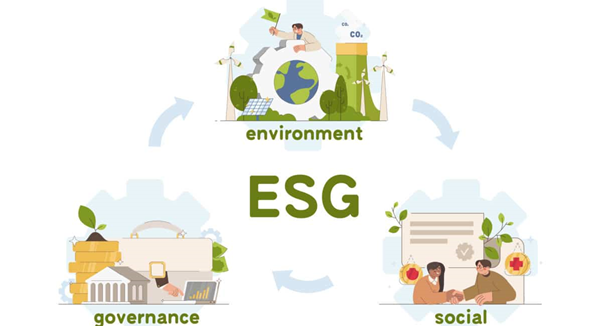
Environmental, Social, and Governance (ESG) factors have emerged as critical pillars of sustainable business practices in the global economy. ESG represents a framework that evaluates a company’s commitment to sustainability through three dimensions: environmental stewardship, social responsibility, and governance excellence. Environmental factors focus on minimizing ecological impact, such as reducing emissions and conserving resources. Social factors emphasize contributions to societal well-being, including diversity, human rights, and community engagement. Governance entails adhering to ethical practices, transparency, and robust decision-making processes. As stakeholders increasingly demand greater accountability and transparency, businesses are compelled to align their operations with ESG principles. This article delves into the evolution of ESG reporting frameworks and examines their implications for Indian businesses, offering insights into challenges, opportunities, and the path forward.

The Growing Relevance of ESG
The growing importance of ESG reporting stems from heightened awareness among investors, regulators, and consumers about sustainable practices. ESG considerations go beyond profitability, emphasizing long-term value creation through responsible governance, environmental stewardship, and social inclusiveness. For Indian businesses, ESG adoption is no longer optional; it is a strategic imperative to remain competitive in a globalized marketplace.
The United Nations’ 2030 Agenda for Sustainable Development and the Paris Agreement have accelerated global efforts toward sustainability. In India, initiatives such as the National Action Plan on Climate Change (NAPCC) and Corporate Social Responsibility (CSR) provisions under the Companies Act, 2013, underscore the country’s commitment to sustainable development.
Evolving ESG Frameworks: A Global Perspective
Several globally recognized ESG frameworks guide businesses in their sustainability journey. These include:
- Global Reporting Initiative (GRI): One of the earliest frameworks, GRI provides comprehensive standards for businesses to report their environmental and social impacts, helping stakeholders assess organizational performance.
- Sustainability Accounting Standards Board (SASB): SASB focuses on industry-specific material ESG issues, aiding investors in comparing company performance across sectors.
- Task Force on Climate-related Financial Disclosures (TCFD): This framework emphasizes climate-related financial risks and opportunities, encouraging organizations to integrate these considerations into their governance and strategy.
- Integrated Reporting: The framework links financial performance with non-financial aspects, promoting a holistic approach to corporate reporting.
These frameworks have evolved to address specific stakeholder needs, reflecting diverse expectations around ESG disclosures.
ESG Reporting in India: Regulatory Landscape
In India, ESG reporting has gained momentum with regulatory interventions by the Securities and Exchange Board of India (SEBI). The Business Responsibility and Sustainability Report (BRSR), introduced in 2021, mandates ESG disclosures for the top 1,000 listed entities by market capitalization. The BRSR is designed to:
- Provide standardized ESG disclosure formats.
- Encourage comparability and accountability among companies.
- Align Indian businesses with global sustainability benchmarks.
Additionally, SEBI has proposed guidelines for ESG rating providers to ensure the credibility and transparency of ESG scores. These measures reflect a progressive approach toward institutionalizing ESG reporting in India.
"Aligning with ESG standards is not merely a regulatory obligation but an opportunity to drive sustainable growth, attract investment, and build a resilient future."
Implications for Indian Businesses
- Enhancing Investor Confidence
ESG-aligned businesses attract institutional investors who prioritize sustainability. Companies with robust ESG practices are better positioned to secure funding, mitigate risks, and enhance shareholder value.
- Driving Operational Efficiency
Adopting ESG principles encourages resource optimization, energy efficiency, and waste management, leading to cost savings and improved operational resilience.
- Strengthening Stakeholder Trust
Transparent ESG reporting fosters trust among customers, employees, and communities. Companies demonstrating genuine commitment to social and environmental causes enjoy stronger brand loyalty.
- Addressing Regulatory Compliance
With stricter regulations on environmental protection and social equity, businesses adhering to ESG standards are better equipped to navigate compliance challenges and avoid penalties.

Challenges in ESG Implementation
While the benefits of ESG reporting are clear, Indian businesses face several challenges:
- Ideological Challenges: The concept of ESG, though widely accepted in principle, often clashes with traditional business ideologies focused solely on profit maximization. Some stakeholders perceive ESG initiatives as ancillary to core business activities, leading to resistance in their adoption. Furthermore, the lack of a unified global standard creates confusion, making it difficult for businesses to align their strategies with varying expectations. Additionally, concerns have been raised that ESG frameworks are sometimes leveraged to push specific ideological agendas under the guise of sustainability. Critics argue that ESG-focused investment decisions may, at times, prioritize certain political or social ideologies over purely business-centric considerations, potentially leading to unintended biases or pressures on companies to conform.
- Removing redundancy and ensuring clarity in reporting are essential steps toward more streamlined ESG practices.
- Data Collection and Standardization: Collecting accurate and consistent ESG data across diverse operations is a complex task.
- Capacity Building: Companies often lack the expertise and resources to implement comprehensive ESG frameworks.
- Balancing Priorities: Balancing immediate financial goals with long-term ESG objectives can be challenging for businesses under pressure to deliver quick returns.
- Greenwashing Risks: Ensuring the authenticity of ESG claims is critical to maintaining stakeholder trust.
The Way Forward
To capitalize on the ESG momentum, Indian businesses must adopt a proactive approach:
- Integrating ESG into Core Strategy: ESG considerations should be embedded into the company’s vision, mission, and values, guiding decision-making at all levels.
- Leveraging Technology: Digital tools and analytics can streamline ESG data collection, monitoring, and reporting, enabling more accurate and efficient disclosures.
- Stakeholder Engagement: Engaging with investors, employees, and communities to understand their expectations can help businesses prioritize material ESG issues.
- Capacity Building: Training and upskilling employees in ESG principles and reporting practices are essential to fostering an organizational culture of sustainability.
Conclusion
The evolution of ESG frameworks represents a paradigm shift in how businesses operate and report their impact on the environment and society. For Indian businesses, aligning with ESG standards is not merely a regulatory obligation but an opportunity to drive sustainable growth, attract investment, and build a resilient future. By embracing comprehensive ESG reporting practices, Indian companies can play a pivotal role in advancing the global sustainability agenda while achieving long-term success in an increasingly conscious world.
Disclaimer:
The content of this article is intended for informational purposes only and should not be construed as professional advice. While we strive to ensure the accuracy and reliability of the information provided, we make no warranties or representations regarding its completeness or applicability. Readers are encouraged to seek professional guidance tailored to their specific circumstances. The views and opinions expressed in the article are those of the author and do not necessarily reflect the official policy or position of our organization.




